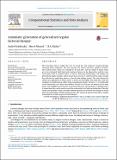Files in this item
Automatic generation of generalised regular factorial designs
Item metadata
| dc.contributor.author | Kobilinsky, André | |
| dc.contributor.author | Monod, Hervé | |
| dc.contributor.author | Bailey, R. A. | |
| dc.date.accessioned | 2017-06-19T14:30:09Z | |
| dc.date.available | 2017-06-19T14:30:09Z | |
| dc.date.issued | 2017-09 | |
| dc.identifier | 245970146 | |
| dc.identifier | baeb5bc6-62c8-4af6-a215-a963d1d583f0 | |
| dc.identifier | 85008616133 | |
| dc.identifier | 000404822600025 | |
| dc.identifier.citation | Kobilinsky , A , Monod , H & Bailey , R A 2017 , ' Automatic generation of generalised regular factorial designs ' , Computational Statistics and Data Analysis , vol. 113 , pp. 311-329 . https://doi.org/10.1016/j.csda.2016.09.003 | en |
| dc.identifier.issn | 0167-9473 | |
| dc.identifier.other | RIS: urn:C1273A33787D9C4F45AD8D0CE3E5A8C9 | |
| dc.identifier.other | ORCID: /0000-0002-8990-2099/work/39600104 | |
| dc.identifier.uri | https://hdl.handle.net/10023/11025 | |
| dc.description | Open Access for this article was paid for by the French Research Agency (ANR), project Escapade (ANR-12-AGRO-0003). | en |
| dc.description.abstract | The R package planor enables the user to search for, and construct, factorial designs satisfying given conditions. The user specifies the factors and their numbers of levels, the factorial terms which are assumed to be non-zero, and the subset of those which are to be estimated. Both block and treatment factors can be allowed for, and they may have either fixed or random effects, as well as hierarchy relationships. The designs are generalised regular designs, which means that each one is constructed by using a design key and that the underlying theory is that of finite abelian groups. The main theoretical results and algorithms on which planor is based are developed and illustrated, with the emphasis on mathematical rather than programming details. Sections 3–5 are dedicated to the elementary case, when the numbers of levels of all factors are powers of the same prime. The ineligible factorial terms associated with users’ specifications are defined and it is shown how they can be used to search for a design key by a backtrack algorithm. Then the results are extended to the case when different primes are involved, by making use of the Sylow decomposition of finite abelian groups. The proposed approach provides a unified framework for a wide range of factorial designs. | |
| dc.format.extent | 19 | |
| dc.format.extent | 519947 | |
| dc.language.iso | eng | |
| dc.relation.ispartof | Computational Statistics and Data Analysis | en |
| dc.subject | Backtrack algorithm | en |
| dc.subject | Design key | en |
| dc.subject | Hierarchy constraint | en |
| dc.subject | Ineligible factorial term | en |
| dc.subject | Model specification | en |
| dc.subject | Multi-stratum design | en |
| dc.subject | QA Mathematics | en |
| dc.subject | QA75 Electronic computers. Computer science | en |
| dc.subject | 3rd-DAS | en |
| dc.subject | BDC | en |
| dc.subject.lcc | QA | en |
| dc.subject.lcc | QA75 | en |
| dc.title | Automatic generation of generalised regular factorial designs | en |
| dc.type | Journal article | en |
| dc.contributor.institution | University of St Andrews. Statistics | en |
| dc.contributor.institution | University of St Andrews. Centre for Interdisciplinary Research in Computational Algebra | en |
| dc.identifier.doi | https://doi.org/10.1016/j.csda.2016.09.003 | |
| dc.description.status | Peer reviewed | en |
This item appears in the following Collection(s)
Items in the St Andrews Research Repository are protected by copyright, with all rights reserved, unless otherwise indicated.

